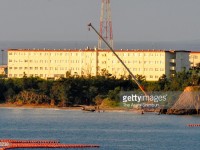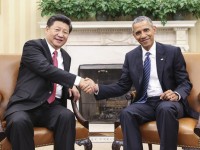Stephen Harner
Former US State Department Official
Mar 10, 2016
Trump’s comments about disadvantageous global trade deals with China could be considered stylistic simplifications—unlikely to be translated into policies—of the position that the U.S. government has sacrificed the interests of the majority, in order to maintain what can only be described as a global “empire.” A Trump presidency could actually usher in more peaceful China-U.S. relations.

Nov 30, 2015
In Tokyo, the Abe government is creating a new base in which the use of any U.S. air, sea, or ground forces will be unrestricted. Part of the Obama administration’s aim to maintain unchallengeable American military supremacy in East Asia, the construction of this base is already increasing tension throughout the region.

Oct 05, 2015
Following President Xi’s recent visit to the U.S., Xi’s concept of “a new model of great power relations” seems to be back on the China-U.S. agenda. Originally pushed by Xi and now being reconsidered by Obama, this concept suggests a major turning point for both countries.
Aug 21, 2015
The Obama administration has delivered a warning to Beijing about the presence of Chinese government agents operating secretly in the United States to pressure prominent expatriates–some wanted in China on charges of corruption–to return home immediately, according to American officials.
Jul 30, 2015
Western press has negatively portrayed China’s Draft Foreign NGO Management Law, framing it as a drive to purge Western values from China. This misses China’s broadening citizen participation and NGOs established by the 2011 NPC.
Jul 02, 2015
Japan’s Abe government is appealing to the nationalistic Japan Restoration Party to revise the constitution to permit the assembly of an army. Lyle J. Goldstein’s book, Meeting China Halfway—How to Defuse the Emerging U.S.-China Rivalry has important suggestions for avoiding a Japan-China military conflict.
Jun 04, 2015
Contrary to America’s desire to impose universal values on the rest of the world, China’s nationalism does not inform or direct its foreign policy. This is exemplified by the institutional contrasts between the U.S. State Department’s Bureau of Democracy, Human Rights, and Labor and China’s Confucius Institutes.
May 06, 2015
Abe’s expansion of Japan’s military capabilities—even within the new “guidelines”—could allow later American administrations, realizing that U.S. strategic interest demand non-confrontational relations with China, to conclude that Japan does need or warrant defense by the United States.
Apr 22, 2015
The Obama administration’s “rebalance to Asia” policy launched in 2010 has turned toward militaristic power-based containment rather than engagement. The Council of Foreign Relations has suggested that the U.S. boost military budgets with its allies, and diminish trade with China, a dangerous and misguided strategy that resembles Cold War tactics.
Mar 17, 2015
Britain has broken ranks with the United States to join China in the founding of the Asian Infrastructure Investment Bank (AIIB). As other nations like Australia and South Korea choose to similarly defy U.S. opposition to the AIIB, and join, it could shake Japan’s confidence in its own position and even in the reliability of its alliance with the U.S.